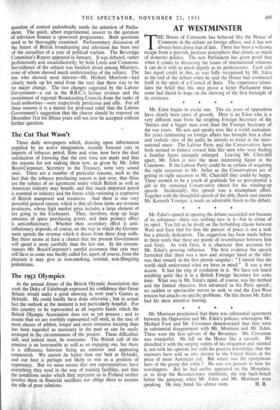AT WESTMINSTER
THE House of Commons has behaved like the House of Commons in the debate on foreign affairs, and it has not . always been doing that of late. There has been a welcome escape from a peevish, partisan atmosphere that clouds so much of domestic politics. The new Parliament has given proof that when it comes to discussing the issues of international relations it can do it with as much dignity as its predecessors. Each side has equal credit in this, as was fully recognised by Mr. Eden at the end of the debate when he said the House had conducted itself in the spirit of a Council of State. The experience stimu- lates the belief that this may prove a better Parliament than some had dared to hope on the showing of the first fortnight of its existence. * * * * Mr. Eden begins to excite one. The six years of opposition have clearly been years of growth. Here is an Eden who is a very different man from the stripling Foreign Secretary of the 'thirties and a bigger man even than the Foreign Secretary of the war years. He acts and speaks now like a world statesman. Six years ruminating on foreign affairs has brought him a clear and realistic view of the paths he intends to tread in the inter- national maze. The Labour Party and the Conservatives have bath seemed to behave toward him like men who were finding a familiar figure strangely enlarged. Leaving Mr. Churchill apart, Mr. Eden is now the most interesting figure in the Commons; If the Labour Party could be as certain of acquiring the right successor to Mr. Attlee as the Conservatives are of getting its right successor to Mr. Churchill they could be happy. There seemed to be a touch of gratitude for so providential a gift in the sustained Conservative cheers for his winding-up speech. Incidentally, this speech was a triumphant effort. Together with the thoughtful speech of the able, fluent and sincere Mr. Kenneth Younger, it made an admirable finish to the debate.
* * * * Mr. Eden's speech in opening the debate succeeded not because of its substance—there was nothing new in it—but in virtue of its spirit. You felt as he dwelt on the forbidding chasm between West and East that for him the pursuit of peace is not a task but a priestly dedication. The suggestion has been made before in these notes that there are points of resemblance between him and Grey. As with Grey, it is character that accounts for Mr. Eden's growing influence. The first evidence the speech furnished that there was a new and stronger hand at the tiller was that remark in the first person singular: " I intend that the world shall understand what we have in mind." It was a new accent. It had the ring of resolution in it. We have not heard anything, quite like it in a British Foreign Secretary for some time. What was in Mr. Eden's mind, of course, was the method and the limited objective, first advanced in his Paris speech ; no sudden or spectacular moves to seek to end the East-West tension but attacks on specific problems. On this theme Mr. Eden had his most attentive hearing.
* * * * Mr. Morrison proclaimed that there was substantial agreement between the Opposition and Mr. Eden's policies, whereupon Mr. Michael Foot and Mr. Crossman demonstrated that they were in substantial disagreement with Mr. Morrison and Mr. Eden. These were the first salvoes of the Bevanites. Mr, Crossman was wonderful. He fell on the House like a cascade. He drenched it with the surging waters of his eloquence and stunned it, not with his opinion, but with his positive knowledge, that the rearmers have sold us into slavery to the United States at the price of more American aid. But where was the eponymous hero of the group this while ? He was not present to hear his worshippers. But he had earlier appeared on the Mountain, or to drop the Revolutionary similitude, the top back-bench below the gangway when Mr. Eden and Mr. Morrison were speaking. He may ,break his silence soon. H. B.


































 Previous page
Previous page